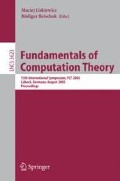Abstract
Combinatorial property testing, initiated formally by Goldreich, Goldwasser, and Ron (1998) and inspired by Rubinfeld and Sudan (1996), deals with the relaxation of decision problems. Given a property P the aim is to decide whether a given input satisfies the property P or is far from having the property. For a family of boolean functions f = (f n ) the associated property is the set of 1-inputs of f. Newman (2002) has proved that properties characterized by oblivious read-once branching programs of constant width are testable, i.e., a number of queries that is independent of the input size is sufficient. We show that Newman’s result cannot be generalized to oblivious read-once branching programs of almost linear size. Moreover, we present a property identified by restricted oblivious read-twice branching programs of constant width and by CNFs with a linear number of clauses, where almost all clauses have constant length, but for which the query complexity is Ω (n 1/4).
Access this chapter
Tax calculation will be finalised at checkout
Purchases are for personal use only
Preview
Unable to display preview. Download preview PDF.
References
Alon, N., Fischer, E., Krivelevich, M., Szegedy, M.: Efficient testing of large graphs. Combinatorica 20, 451–476 (2000)
Alon, N., Krivelevich, M., Newman, I., Szegedy, M.: Regular languages are testable with a constant number of queries. SIAM Journal on Computing 30, 1842–1862 (2000)
Alon, N., Shapira, A.: Every monotone graph property is testable. In: Proc. of 37th STOC (2005) (to appear)
Ben-Sasson, E., Harsha, P., Raskhodnikova, S.: Some 3CNF properties are hard to test. In: Proc. of 35th STOC, pp. 345–354 (2003)
Bogdanov, A., Obata, K., Trevisan, L.: A lower bound for testing 3- colorability in bounded-degree graphs. In: Proc. of 43rd FOCS, pp. 93–102 (2002)
Bollig, B., Wegener, I.: Functions that have read-once branching programs of quadratic size are not necessarily testable. Information Processing Letters 87, 25–29 (2003)
Fischer, E.: The art of uninformed decisions: a primer to property testing. Bulletin of the European Association for Theoretical Computer Science 75, 97–126 (2001), The Computational Complexity Column
Fischer, E.: On the strength of comparisons in property testing. Information and Computation 189, 107–116 (2004)
Fischer, E.: The difficulty of testing for isomorphism against a graph that is given in advance. In: Proc. of 36th STOC, pp. 391–397 (2004a)
Fischer, E., Lehman, E., Newman, I., Reskhodnikova, S., Rubinfeld, R., Samorodnitsky: Monotonicity testing over general poset domains. In: Proc. of 34th STOC, pp. 73–79 (2002)
Fischer, E., Newman, I.: Testing of matrix properties. In: Proc. of 33rd STOC, pp. 286–295 (2001)
Fischer, E., Newman, I.: Testing versus estimation of graph properties. In: Proc. of 37th STOC (2005) (to appear)
Fischer, E., Newman, I., Sgall, J.: Functions that have read-twice constant width branching programs are not necessarily testable. Random Structures and Algorithms 24(2), 175–193 (2004)
Goldreich, O., Goldwasser, S., Ron, D.: Property testing and its connection to learning and approximation. Journal of the ACM 45, 653–750 (1998)
Newman, I.: Testing membership in languages that have small width branching programs. SIAM Journal of Computing 31(5), 1557–1570 (2002)
Newman, I.: Private communication (2002a)
Ron, D.: Property testing (a tutorial). In: Rajasekaran, S., Pardalos, P.M., Reif, J.H., Rolim, J.D. (eds.) Handbook of Randomized Computing. Combinatorial Optimization, vol. 9, pp. 597–649. Kluwer Academic Publishers, Dordrecht (2001)
Rubinfeld, R., Sudan, M.: Robust characterization of polynomials with applications to program testing. SIAM Journal of Computing 25(2), 252–271 (1996)
Yao, A.C.: Probabilistic computation, towards a unified measure of complexity. In: Proc. of 18th FOCS, pp. 222–227 (1977)
Author information
Authors and Affiliations
Editor information
Editors and Affiliations
Rights and permissions
Copyright information
© 2005 Springer-Verlag Berlin Heidelberg
About this paper
Cite this paper
Bollig, B. (2005). Property Testing and the Branching Program Size of Boolean Functions. In: Liśkiewicz, M., Reischuk, R. (eds) Fundamentals of Computation Theory. FCT 2005. Lecture Notes in Computer Science, vol 3623. Springer, Berlin, Heidelberg. https://doi.org/10.1007/11537311_23
Download citation
DOI: https://doi.org/10.1007/11537311_23
Publisher Name: Springer, Berlin, Heidelberg
Print ISBN: 978-3-540-28193-1
Online ISBN: 978-3-540-31873-6
eBook Packages: Computer ScienceComputer Science (R0)

